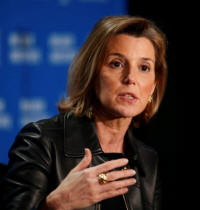|
Q&A: Sallie Krawcheck has
a new game plan for women at work
 Send a link to a friend
Send a link to a friend
 [January 17, 2017]
By Chris Taylor [January 17, 2017]
By Chris Taylor
NEW
YORK (Reuters) - For decades, Wall Street was the ultimate boys club of
all boys clubs.
Then came Sallie Krawcheck. As the former CEO of Smith Barney, head of
Merrill Lynch's "thundering herd" and chief financial officer for
Citigroup, Krawcheck kicked down those boardroom doors - and did it with
a smile.
Now head of investment platform Ellevest and chair of Ellevate Network
(https://www.ellevatenetwork.com/), Krawcheck is releasing the book "Own
It: The Power of Women at Work" this week. She spoke with Reuters about
how women are ideally positioned to thrive in a next-gen business world.
Q: Sheryl Sandberg's book "Lean In" started so many discussions about
women in the workplace, so how does this book contribute to the
conversation?
A: I hope this is the next chapter. I wanted this book to be about how
to succeed in the business world of tomorrow, since everything is
changing so rapidly. There are certain characteristics that women tend
to bring to the workplace, and the business world is going our way. So
the last thing I want to do is to tell women to act like men.

Q: What are those characteristics that women often bring to the table?
A: Women tend to have a more long-term perspective. We are more
risk-aware, we have a love of learning, we have more of a focus on
meaning and purpose. Now think about how the business world is changing:
It has moved away from command-and-control leadership styles, and toward
more collaboration and communication.
Q: What is your best advice for women who are trying to thrive in
male-dominated fields?
A: I would say that it is not necessarily a bad thing to work with a
bunch of men. In fact it can be fantastic. The bigger question is
whether it is a corporate culture where you can learn, where others will
help you - and whether your voice will be heard.
Q: What do you think about the typical 'Having It All' question?
A: It drives me nuts. What the heck does that even mean? The answer is
that I don't have perfect work-life balance, and I never had it. When I
was running Merrill Lynch, I was spending much more time at the office;
when my children had health issues, I spent more time with my family. So
I think it is the wrong question to ask.
No one can be perfect in every way. That is just too high a bar. Around
my house, the joke is that I am a mediocre mother at best.

[to top of second column] |

Sallie Krawcheck, CEO and Co-Founder of Ellevest, speaks at the
Milken Institute Global Conference in Beverly Hills, California,
U.S., May 2, 2016. REUTERS/Lucy Nicholson

Q: You lived through the financial crisis with a front-row seat - how
did the lack of diversity on Wall Street play into that?
A: The industry is obviously homogenous. Go to any trading floor, and
you will see mostly well-educated, analytical, young and middle-aged
Caucasian males. You and I both know if there was more diversity on
trading floors, the financial crisis would not have been as bad.
With a more diverse leadership team you get more questioning, and more
carefully thought-out decisions, rather than the false comfort of
agreement.
Q: Why was it important for you to talk about your own career setbacks
in the book?
A: Because women tend to take failure harder than men do. They get
embarrassed, or try to run away from it.
But there is a certain freedom about being fired on the front page of
the Wall Street Journal, like I was. Maybe getting fired used to be
fatal, but it's not anymore. In fact, going forward, people are going to
be fired even more, because of how the business world is changing. So we
need to normalize it.

Q: Why is having the 'insurance' of a strong network so critical?
A: If you ever want a new job, or a board seat, or have a career
stumble, you see the real power of a network. I have had a number of
business opportunities over the years, and not a single one ever came
through an executive search firm. Make sure your network extends well
beyond your own company, by the way. Otherwise, on the day you quit or
are fired, you're done.
(The writer is a Reuters contributor. The opinions expressed are his
own.)
(Editing by Beth Pinsker and Dan Grebler)
[© 2017 Thomson Reuters. All rights
reserved.] Copyright 2017 Reuters. All rights reserved. This material may not be published,
broadcast, rewritten or redistributed. |